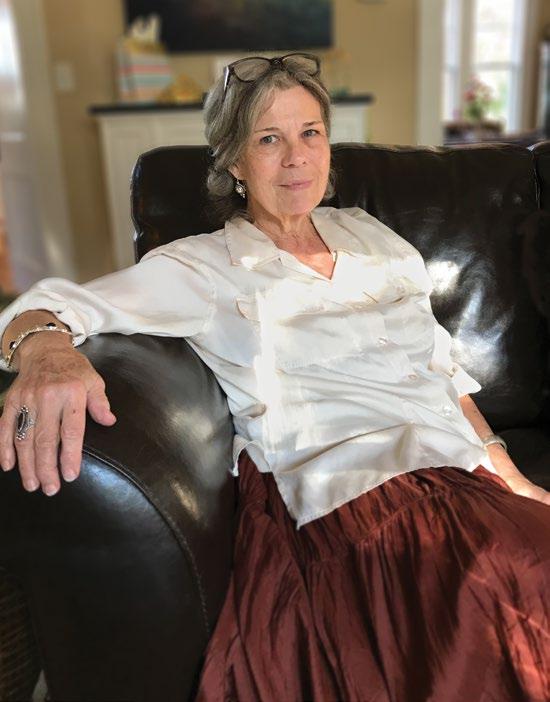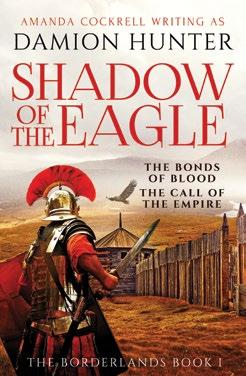
5 minute read
Don’t Call It a Comeback
Former Director of Hollins’ Children’s Literature Program Amanda Cockrell Finds Post-Retirement Success In Writing
About the Past BY JEFF DINGLER M.F.A. ’22
As a writer, Amanda Cockrell ’69, M.A. ’88 has a good understanding of how the past repeats and variates itself. “The adage holds that those who do not learn from history are condemned to repeat its mistakes, and I think that’s true,” said Cockrell. “But if history repeats itself, it never does so exactly or we would probably be better prepared for it.”
Speaking of that, Cockrell wasn’t prepared for how busy, or productive, her retirement would be. After 26 years working at Hollins as an educator and the first director of the university’s children’s literature program, Cockrell hung up her academic regalia in 2018— but since then she’s felt anything but “retired.” In addition to continuing her work as managing editor of The Hollins Critic, Cockrell has published three new books, nearly one a year, and not slim children’s books (as one might expect from the former director) but rather meaty works of historical fiction.
“It feels wonderful—had pretty much decided I was probably not going to publish anything else and that was fine,” said Cockrell about her postretirement inspiration. The Hollins alumna hadn’t published a new book since 2011, and even though she was the founding director of Hollins’ children’s literature program, which under her leadership branched into multiple degrees and certifications, Cockrell’s writing career has been solely focused on fiction. “This whole thing has been a huge and gratifying surprise, especially the success of the new books.”
Her newest novel, The Shadow of the Eagle, will be available online and in bookstores on May 26, and it’s the first in a new three-book series of Roman-era historical fiction called The Borderlands. Set nearly 2,000 years ago along the fringes of the Roman Empire in modernday Britain, The Shadow of the Eagle follows Faustus Valerianus, the son of a Roman father and a British mother, as he joins the legendary general Agricola’s campaign to conquer all of the British Isles, pitting Faustus (in a very Faustian pact) against his allegiance to the empire and the bonds of his own
blood. The book has already received some high praise, being described by major Roman history writer Simon Scarrow as “a brilliantly realized world of Imperial ambition and Native resistance and the inevitable clashes that arise.”
“What keeps me interested about the Romans is how wonderfully and appallingly like us they are,” said Cockrell. “They are the template for Western government but also for Western colonialism, with their self-assured conviction that Roman civilization was a boon to any conquered people. And these days, it’s pleasant to go live some other ‘when’ for a while.”
Of course, this isn’t Cockrell’s first fictional foray into the past. Her 1979 debut novel Legions of the Mist also took place in ancient Britain and was inspired by Rosemary Sutcliff’s fictional account of the mysterious disappearance of the Roman Ninth Legion. “The Legions of the Mist was actually begun my senior year at Hollins as a January Term project,” recalled Cockrell. “It took me 10 years to get up the gumption to finish it. After that, because I wanted to quit my day job, I signed on with a book packager who specialized in historical series and I wrote three Roman books (as well as a lot of others) for them.”
In the tradition of many Hollins alumnae/i before her, Cockrell was breaking new ground, working in a genre that was generally frowned upon for women. However, even though her first novel had been published under her own name, the next three would be published under a nom de plume: turning Cockrell into Damion Hunter, a male. “It wasn’t my decision,” said Cockrell. “When I got a contract to write The Centurions series for a book packager in the ’80s, they insisted on pseudonyms, partly because they wanted to be able to continue a successful series if the writer got bored with it. But I’m sure that picking a male name was deliberate. It was held that women didn’t write

historical adventure. In fact, a fan once told me that another reader (a woman!) had told him that the series couldn’t be any good if a woman wrote it.”
Although The Centurions series was published under another name, it led to many more opportunities for Cockrell, who was able to stretch her creative legs. Since then, she has written in many other genres, including contemporary fiction, mythological fiction, and even young adult with What We Keep Is Not Always What Will Stay (named a Best Book for Children by the Boston Globe), all books published under her own name.
However, after her publisher was acquired by another house in 1998, Cockrell’s older titles as Damion Hunter fell out of print, where they languished for years. That is, until right after her retirement from Hollins, when the UK publishing house Canelo emailed Cockrell out of the blue wanting to reprint The Centurions books as well as Legions of the Mist. “They found that the old pseudonym had some name recognition among Roman fans, and you never want to waste that,” said the Hollins alumna. “But I wanted my name on them. So we settled on publishing both the old and the new books as ‘Amanda Cockrell writing as Damion Hunter.’”
That turned out to be a wise decision. Since then, Cockrell has been in a writing frenzy, penning The Wall at the Edge of the World in 2020 (a sort of sequel to Legions) and The Border Wolves in 2021, the fourth and final volume in The Centurions that had been canceled more than two decades before. “This was the surprise of my retirement,” said Cockrell. “All my Roman books are now back in print!”
And Cockrell doesn’t appear to be slowing down. She’s already hard at work on Edge of Empire, the second of Faustus’ stories in The Borderlands. “Roman fiction is hot right now,” said Cockrell, always aware and writing about the fickleness of history. “I have no idea why, any more than I do why it wasn’t hot 30 years ago. My one conclusion is that the publishing biz is a crapshoot, but we knew that.”






